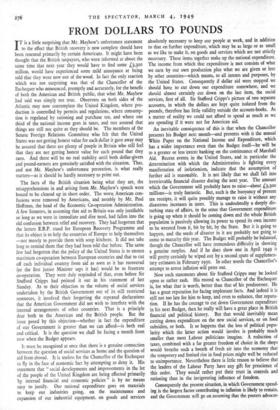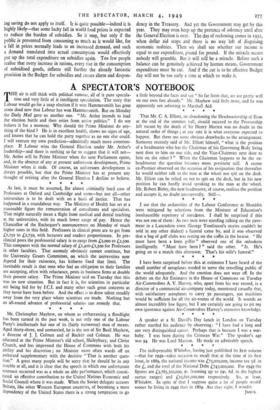FROM DOLLARS TO POUNDS
IT is a little surprising that Mr. Mayhew's unfortunate statement to the effect that British recovery is now complete should have been resented primarily by certain Americans. It might have been thought that the British taxpayers, who were informed at about the same time that next year they would have to find some £3,300 million, would have experienced some mild annoyance at being told that they were now out of the wood. In fact the only reaction which was not surprising was that of the Chancellor of the Exchequer who announced, promptly and accurately, for the benefit of both the American and British public, that what Mr. Mayhew had said was simply not true. Observers on both sides of the Atlantic may now contemplate the United Kingdom, where pro- duction is controlled by permits and regulations, where consump- tion is regulated by rationing and purchase tax, and where one third of the national income goes in taxes, and rest assured that things are still not quite as they should be. The members of the Senate Foreign Relations Committee who felt that the United States was not getting honest value for each dollar it gave away may be assured that there are plenty of people in Britain who still feel that they are not getting honest value for each pound that they earn. And there will be no real stability until both dollar-givers and pound-earners are genuinely satisfied with the situation. That, and not Mr. Mayhew's unfortunate peroration, is what really matters—as it should be hardly necessary to point out.
The facts of the British situation being what they are, the misapprehensions in and arising from Mr. Mayhew's speech were bound to be cleared up in short order. The worst American con- fusions were removed by Americans, and notably by Mr. Paul Hoffman, the head of the Economic Co-operation Administration. A few Senators, in assuming that aid to Britain was only justifiable so long as we were in immediate and dire need, had fallen into the old confusion between relief and recovery. They had forgotten that the letters E.R.P. stand for European Recovery Programme and that its object is to help the countries of Europe to help themselves —not merely to provide them with soup kitchens. It did not take long to remind them that they had been told that before. The same few had forgotten that the policy of the United States is to ensure maximum co-operation between European countries and that to cut off each individual country from aid as soon as it has recovered (or the first junior Minister says it has) would be to frustrate co-operation. They were duly reminded of that, even before Sir Stafford Cripps had pointed it out in his statement of last Sunday. As to their objection to the volume of social services undertaken by the British Government out of its still restricted resources, it involved their forgetting the repeated declarations that the American Government did not wish to interfere with the internal arrangements of other countries. That is a principle dear both to the American and the British people. But the issue posed by this objection—whether in fact the expenditure of our Government is greater than we can afford—is both real and critical. It is the question we shall be facing a month from now when the Budget appears.
It must be recognised at once that there is a genuine connection between the question of social services at home and the question of aid from abroad. It is useless for the Chancellor of the Exchequer to fly in the face of economic fact by attempting to deny it. His statement that " social developments and improvements in the lot of the people of the United Kingdom are being effected primarily by internal financial and economic policies " is by no means easy to justify. Our national expenditure goes on materials to keep our industries going, on the maintenance and expansion of our industrial equipment, on goods and services absolutely necessary to keep our people at work, and in addition to that on further expenditure, which may be as large or as small as we like to make it, on goods and services which are not strictly necessary. These items together make up the national expenditure. The income from which that expenditure is met consists of what we earn by our own production plus what we are given or lent by other countries—which means, to all intents and purposes, by the United States. Consequently if dollar aid were stopped we should have to cut down our expenditure somewhere, and we should almost certainly cut down on the last item, the social services, first of all. Sir Stafford Cripps's picture of two separate accounts, in which the dollars are kept quite isolated from the pounds, therefore has little validity outside the account-books. As a matter of reality we could not afford to spend as much as we are spending if it were not for American aid.
An inevitable consequence of this is that when the Chancellor presents his Budget next month—and presents with it the annual White Paper on the National Income and Expenditure, which has a wider importance even than the Budget itself—he will be to a greater or less extent banking on the continuance of Marshall Aid. Recent events in the United States, and in particular the determination with which the Administration is fighting every manifestation of isolationism, indicate that the assumption of further aid is reasonable. It is not likely that we shall fall into irretrievable financial disaster during the next year. The amount which the Government will probably have to raise—about L3,300 millions—is truly fantastic. But, such is the buoyancy of present tax receipts, it will quite possibly manage to raise it without any disastrous increases in taxes. This is undoubtedly a deeply dis- turbing state of affairs, in the sense that Government expenditure is going up when it should be coming down and the whole British population is passively allowing its power to spend its own income to be wrested from it, bit by bit, by the State. But it is going to happen, and the seeds of disaster in it are probably not going to come to maturity this year. The Budget will probably be balanced, though the Chancellor will have tremendous difficulty in showing a genuine surplus. And if he does show one in April 1949 it will pretty certainly be wiped out by a second spate of supplemen- tary estimates in February 1950. In other words the Chancellor's attempt to arrest inflation will peter out.
Now such statements about Sir Stafford Cripps may be looked upon as rather rash. His record as Chancellor of the Exchequer is, for what that is worth, better than that of his predecessor. He has a great reputation for facing unpleasant facts. And indeed it is still not too late for him to keep, and even to enhance, that reputa- tion. If he has the courage to cut down Government expenditure in his next Budget, then he really will have a great place in British financial and political history. But that would inevitably mean cutting down expenditure on the new social services, or on food subsidies, or both. It so happens that the loss of political popu- larity which the latter action would involve is probably much smaller than most Labour politicians imagine. A reduction of taxes, combined with a far greater freedom of choice in the shops would breathe such a breath of fresh air into the economy that the temporary and limited rise in food prices might well be reduced to unimportance. Nevertheless there is little reason to believe that the leaders of the Labour Party have any gift for prescience of this order. They would rather put their trust in controls and rationing than in the invigorating influence of freedom.
Consequently the present situation, in which Government spend- ing is the largest factor contributing to inflation is likely to remain, and the Government will go on assuming that the posters advocat- 1ng saving do not apply to itself. It is quite possible—indeed it is highly likely—that some lucky fall in world food prices is expected to reduce the burden of subsidies. So it may, but only if the public is prevented from consuming as much as it would like, for a fall in prices normally leads to an increased demand, and such a demand translated into actual consumption would effectively put up the total expenditure on subsidies again. Too few people realise that every increase in rations, every rise in the consumption of subsidised goods, inflates still further the already fantastic provision in the Budget for subsidies and causes alarm and despon- dency in the Treasury. And yet the Government may get by this year. They may even keep up the pretence of solvency until after the General Election is over. The day of reckoning comes in 1952, when dollar aid stops and there is no way left of disguising economic realities. Then we shall see whether our income is equal to our expenditure, pound for pound. If the miracle occurs nobody will grumble. But it will still be a miracle. Before such a balance can be genuinely achieved by human means, Government expenditure must be cut. And if the cut is to be effective Budget day will not be too early a time at which to make it.







































 Previous page
Previous page